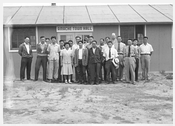On August 31, 1942 just four days after the arrival of the
first evacuees a Community Council was selected to serve as a
temporary liaison unit between the evacuees and the project director
(Holsinger
1960: 51). The council with the approval of the project officials
proposed a democratic government for the camp. The central executive
and legislative body of the center was to be a Community Council
composed of one representative from each of the twenty-nine blocks.
Members were to be elected by popular vote from the block where
they lived by all who were eighteen years of age. "The WRA
barred the Issei from holding elected office within camps and
 put greater authority in the hands
of the Nisei, who were eligible to become block leaders and council
members" (Chang
1996: 51). Five of the twenty-nine elected representatives
were to be chosen to be members of the council's executive committee.
This council was responsible for the ordinances, regulations,
and laws governing the center. Furthermore, a judicial commission
was comprised of eight members who were appointed by the council.
This commission was responsible for hearing and trying cases involving
the violation of local regulations. In addition to the judicial
commission an arbitration commission was formed of 15 members.
This commission was responsible for arbitrating civil disputes
within the center. The Community Council officially began to function
on November 4, 1942 and by December 30 their charter
for self-government was approved by the main WRA office in Washington,
D.C.
put greater authority in the hands
of the Nisei, who were eligible to become block leaders and council
members" (Chang
1996: 51). Five of the twenty-nine elected representatives
were to be chosen to be members of the council's executive committee.
This council was responsible for the ordinances, regulations,
and laws governing the center. Furthermore, a judicial commission
was comprised of eight members who were appointed by the council.
This commission was responsible for hearing and trying cases involving
the violation of local regulations. In addition to the judicial
commission an arbitration commission was formed of 15 members.
This commission was responsible for arbitrating civil disputes
within the center. The Community Council officially began to function
on November 4, 1942 and by December 30 their charter
for self-government was approved by the main WRA office in Washington,
D.C.
Besides the Community Council, block managers were nominated
by the residents and appointed by the project director. The block
manager was responsible for "handling the requests on housing,
heating and household supplies, assisting the family in case of
death in making all needed arrangements, relaying announcements
and instructions from administrative services, and also to advise
the personnel director on employment" (War
Relocation Authority 1944: 10). These managers further kept
population and occupational records as well as vital statistics.
The block managers developed by-laws
which they followed.
![Administration]()
Administration

Return to Amache

 put greater authority in the hands
of the Nisei, who were eligible to become block leaders and council
members" (Chang
1996: 51). Five of the twenty-nine elected representatives
were to be chosen to be members of the council's executive committee.
This council was responsible for the ordinances, regulations,
and laws governing the center. Furthermore, a judicial commission
was comprised of eight members who were appointed by the council.
This commission was responsible for hearing and trying cases involving
the violation of local regulations. In addition to the judicial
commission an arbitration commission was formed of 15 members.
This commission was responsible for arbitrating civil disputes
within the center. The Community Council officially began to function
on November 4, 1942 and by December 30 their charter
for self-government was approved by the main WRA office in Washington,
D.C.
put greater authority in the hands
of the Nisei, who were eligible to become block leaders and council
members" (Chang
1996: 51). Five of the twenty-nine elected representatives
were to be chosen to be members of the council's executive committee.
This council was responsible for the ordinances, regulations,
and laws governing the center. Furthermore, a judicial commission
was comprised of eight members who were appointed by the council.
This commission was responsible for hearing and trying cases involving
the violation of local regulations. In addition to the judicial
commission an arbitration commission was formed of 15 members.
This commission was responsible for arbitrating civil disputes
within the center. The Community Council officially began to function
on November 4, 1942 and by December 30 their charter
for self-government was approved by the main WRA office in Washington,
D.C.